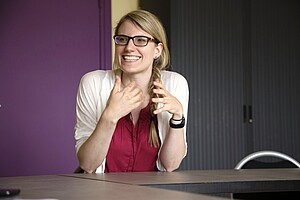Publication date: 22/07/16
ThemesNews
Tina Jühling is preparing a thesis in molecular biology and biological chemistry under joint supervision in Leipzig and Strasbourg. Despite a lot of time spent traveling between the two universities, it is an enriching experience.
Tina Jühling had decided to pursue a Franco-German career early in her course of studies by participating to student exchanges and spending a year in French-speaking Switzerland as an au pair. She later graduated with a dual bachelor’s degree in life sciences at the universities of Strasbourg and Sarrebruck, which allowed her to combine her two favourite subjects: French and biology. After completing a Master’s degree in Marburg, she came back to Unistra to pursue her PhD under international joint supervision.
Her thesis work focuses on the characterization of two proteins interacting with the same mitochondrial molecule. Her two research teams in Strasbourg and Leipzig are specialized in one protein each. Her research schedule was planned in accordance by her thesis supervisors, Mario Mörl and Catherine Florentz: after working in Leipzig from October 2013 to May 2015 she is now spending the last year and a half in Strasbourg. The Franco-German University is providing her with financial support during her mobility.
















